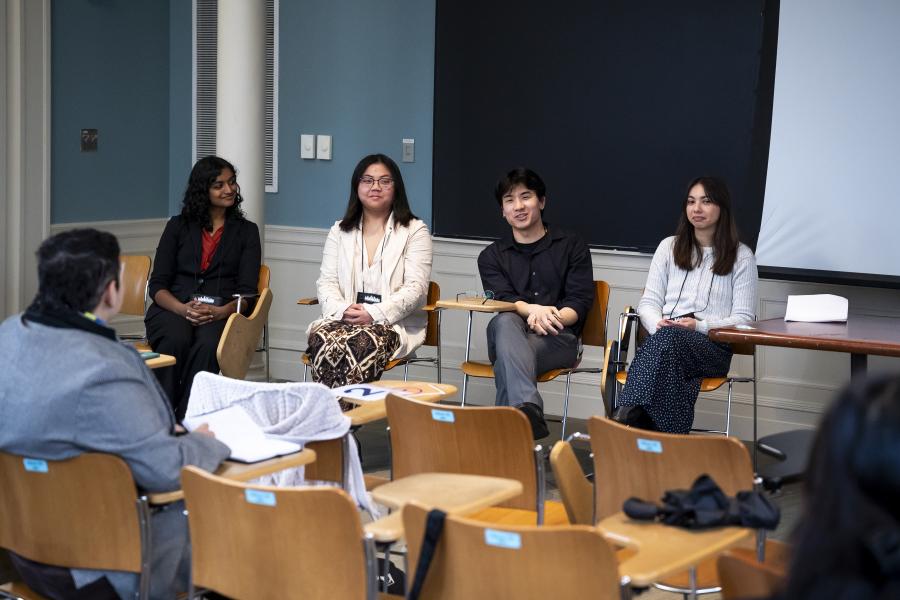In one Gilman Hall classroom, the discussion had turned to questions of honor. What was it, did it historically apply to women as well as men, and had U.S. ideas about it changed since the time of the infamous Hamilton-Burr duel?
One floor up, the focus was on what defines the genre of gothic or occult novels. One panelist held that ghost stories don't need actual ghosts; that their psychological aspects are sufficient. Another said that disconnection is what allows the occultic to take place, and a third proposed an additional type of occultic-defining narrative to add to the accepted two: multigenerational circularity. "It taps into our deep fear that an individual's life and death are predetermined," said Audra Nikolajski, an undergraduate at the University of South Florida. A fourth panelist discussed Latina characters in gothic literature, noting that there are few.
The presentations and their lively Q&A sessions took place during the Richard Macksey National Undergraduate Humanities Research Symposium, held on the Homewood campus March 21-23. It's the fifth year for the symposium, which brings together undergraduate humanities students from across the country to present their work to a national audience. This year, 175 students gave presentations all day Friday and Saturday in panels of three to four students each.
"It's really interesting to learn about a variety of things that you don't necessarily get in the classroom. I'm super excited because of how different all of the topics are, and I'm already feeling inspired for future research," said Kayleigh Fick of the University of the Pacific. Fick would later present a rhetorical analysis of Eva Perón's speeches, and had just finished moderating a panel titled Episodes in U.S. History.
Each panel was moderated by a student volunteer—supported with guidelines and video tutorials—who also presented in a different session. Panels included themes like Culture and Community in the U.S. South, Reflections on Poetry, Humanistic Perspectives on Medicine, and The Sacred and the Spiritual.
"I was so shocked looking at the program with how interdisciplinary this conference is. I had not imagined something with so many different topics," said the College of William and Mary's Amy Weitzman, who had given the presentation about honor. "When I was choosing the panels to go to, I specifically chose ones I'd never heard anything about before. The questions that I've been asked really made me think about things I wouldn't have thought about otherwise."
A Friday evening keynote was given by Sami Schalk, associate professor of gender and women's studies at the University of Wisconsin-Madison. Her talk, open to the public, explored the Black Panther Party's involvement in 1977's 504 Sit-in—when a group of people with disabilities protested in San Francisco to demand greater accessibility and accommodations for people with disabilities—as an example of how Black cultural workers have engaged with disability as a political issue. Schalk also signed copies of her books, Black Disability Politics and Bodyminds Reimagined: (Dis)ability, Race, and Gender in Black Women's Speculative Fiction.
A Saturday afternoon plenary featured ongoing collaboration between student researchers at Johns Hopkins and Morgan State University on the Black Panther Party in Baltimore, making use of the almost complete collection of The Black Panther, the party's newspaper, recently acquired by the Sheridan Libraries.
Mingling with panelists—and the family members many brought with them—conference chair Jennifer Wester overheard discussions that didn't stop when sessions ended, and conversations sparked by passion for a common author.
"It's a nice way of highlighting what humanities research can do to engage with contemporary issues and really put a new lens on things that we thought we understood, and that's what I see these students doing, especially as young scholars," said Wester, director of the Krieger School's Office of Undergraduate Research, Scholarly & Creative Activity (URSCA).
"We're always trying to convince undergraduates that you have an important voice. Your unique voice, your unique perspective, is needed. I want them to have the confidence of 'I am a scholar; I am part of the scholarly conversation.'"
The symposium is named in honor of the late Richard A. Macksey, Professor Emeritus in the Department of Comparative Thought and Literature, a legend in the fields of critical theory, comparative literature, and film studies and a leader in the humanities overall. The event is hosted by URSCA, which also publishes a peer-reviewed journal of the proceedings—the Macksey Journal—the first undergraduate journal of its kind. URSCA oversees research grants, fellowships, and programs for Krieger School undergraduates and visiting undergraduate researchers from across the U.S.
Posted in Arts+Culture
Tagged richard macksey








